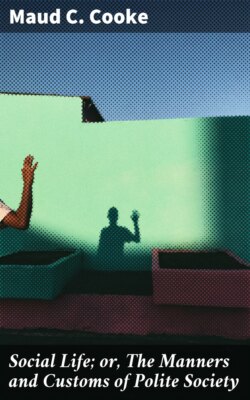Читать книгу Social Life; or, The Manners and Customs of Polite Society - Maud C. Cooke - Страница 26
На сайте Литреса книга снята с продажи.
Words of Salutation.
ОглавлениеTable of Contents
Verbal greetings ought always to be quiet and respectful; they should never be shouted across streets, nor called when the parties are at any distance from each other. Nicknames should not be used publicly and promiscuously, in short, all possible respect should be paid to the feelings of other persons on public occasions.
The phrases, "Good morning," "Good evening," "Good afternoon," "How do you do?" "How are you?" are the usual forms employed. Sometimes the name of the person addressed is added, thus: "Good morning, Mrs. Smith."
Replies to these salutations are sometimes simply a bow from a lady to a gentleman, or perhaps a bow and a repetition of his greeting, as: "Good morning, Mr. Jones." "How do you do," should be replied to by the same phrase, never, as is often the case with the novice in social arts, by: "I am very well, thank you." A special inquiry after one's health, however, as: "How do you do, Mrs. Jones?" followed, after her acknowledgment, by: "How are you?" or, "How is your health?" should receive the response, "I am very well, thank you." After an acquaintance has been ill, the first inquiry by a friend should be one concerning health. This is a rule that should never be neglected; to do so would be an oversight.
Kissing is a custom which the code of English and American etiquette relegates as much as possible to the privacy of home. A kiss, the outward expression of our closest affection and our warmest love, should never be made a public show whereat the outside world may smile. Hence, the effusive kissing between girls and women at their meeting and their parting, is to be regretted as a specimen, to say the least, of very bad taste on their part. Indiscriminate kissing of children and infants is also objectionable on the score of health. Happily, kisses and embraces among men are never seen in this country, though, in some parts of Europe they are constantly to be observed, both in public and private.
A SOCIETY BALL—SHOWING FASHIONABLE COSTUMES.
“TALK often," says Lord Chesterfield, "but never long; in that case if you do not please, at least you are sure not to tire your hearers. Pay your own reckoning, but do not treat the entire company: this being one of the very few cases in which people do not care to be treated, every one being fully convinced that he has the wherewithal to pay."
All other arts pale before the art of conversation as a source of popularity, and no other accomplishment tends so much toward social success. The contact of many minds is a constant stimulus to mental activity and its outward expression in animated conversation. It lends new power to brilliancy of talent, and quickens, to a certain extent, even the lowest and dullest of intellects.
Everyone has been surprised and delighted at times by some unexpectedly brilliant remark that has flashed from his lips during the course of some animated exchange of badinage and repartee, and there is no one but realizes how the mind acquires breadth and the opinions grow tolerant as one converses with persons of intelligence and culture.
Since, however, according to Cicero, "Silence is one of the greatest arts of conversation," there may be added, with equal wisdom, to the above counsel, "Listen often and well." Be not an impatient listener, nor yet an impassive one, but pay the compliment of attention and interest to the subject in hand, and your company will be sought as an acquisition.
Any lady, by profound attention to, and a pleased interest in the subject under consideration, may promote the conversation most skillfully and delightfully. Knowledge of the subject is not always necessary. An English savant, deeply interested in Egyptology, once escorted a young lady out to dinner. His conversation, as a matter of course, turned entirely upon excavations, hieroglyphics, and kindred topics. Upon all these the young lady was profoundly ignorant, but, if unversed in Egyptian lore, she was most thoroughly versed in conversational arts, and, by her speaking glances of intelligence and her pleased smile, so fascinated the man of science that he enthusiastically declared afterward that "Miss L—— was one of the best conversationalists and the most intelligent young lady he had ever met, and that her knowledge of Egyptology was something wonderful." This, to one who had sat opposite them at table, and could have vouched that the lady in question had not spoken a single word through the entire dinner, was slightly amusing. So strong however, was the impression left upon the mind of the savant by her interested attention, that it would have been difficult to convince him of the fact.
